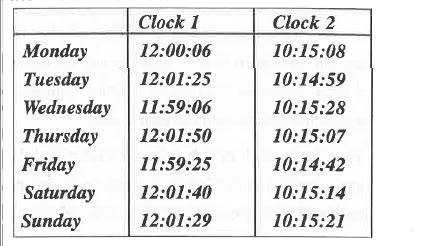Two clocks are being tested against a standard clock located in a national laboratory At 12 : 00 : 00 noon by standard clock, the readins of the two clocks are
DayClock - IClock - IIMonday12:00:0510:15:06Tuesday12:01:1510:14:59Wednesday11:59:0810:15:18Thursday12:01:5010:15:07Thursday12:01:5010:15:07Friday11:59:1510:14:53Saturday12:01:3010:15:24Sunday12:01:1910:15:11
From the Observations carefully read the following conclusive statements.
Statement I : Zero - error in clock II is much longer than zero - error in clock I.
Statement II : Zero - error can always be corrected by applying necessary corrective measures
Statement III : Precision of clock - I is more than precision of clock - II
Statement IV : Precision of clock - II is more than precision of clock - I
Pick up the correction option from the following. Solution in Telugu
The range of variation over the seven days of observations is 164 s for clock 1, and 32 s for clock 2. The average reading of clock 1 is much closer to the standard time than the average reading of clock 2.
The important point is that a clock is zero error is not as significant for precision work as its variation, because a .zero-error. can always be easily corrected. Hence clock 2 is to be preferred to clock 1.
Similar Questions
Two clocks are being tested against a standard clock located in a national laboratory. At 12:00:00 noon by the standard clock, the readings of the two clocks are : If you are doing an experiment that requires 'precision time interval' measurements , which of the two clocks will you prefer ?
View SolutionTwo clocks are being tested against a standard clock located in a national laboratory. At 12:00:00 noon by the standard clock , the readings of the two clocks are : If you are doing an experiment that requires 'precision time interval' measurements, which of the two clocks will you prefer? c
View SolutionTwo clocks are being tested against a standard clock located in a national laboratory. At 12:00:00 noon by the standard clock , the readings of the two clocks are :

If you are doing an experiment that requires 'precision time interval' measurements, which of the two clocks will you prefer? c
View SolutionTwo clocks are being tested against a standard clock located in a national laboratory. At 12:00:00 noon by the standard clock, the readings of the two clocks are : {:(,"Clock1", "Clock 2"),("Monday",12:00:05:,10:15:06),("Tuesday",12:01:15,10:14:18),("Wednesday",11:59:08,10:15:18),("Thursday",12:01:50,10:15:07),("Friday",11:59:15,10:14:53),("Saturday",12:01:30,10:15:24),("Sunday",12:01:19,10:15:11), ("Sunday",12:01:19,10:15:11):} If you are doing an experiment that requires precision time interval measurements, which of the two clocks will you prefer? The range of variation in time of clock ?
View SolutionTwo clocks are being tested against a standard clock located in a national laboratory. At 12:00:00 noon by the standard clock, the readings of the two clocks are :
Clock1Clock 2Monday12:00:05:10:15:06Tuesday12:01:1510:14:18Wednesday11:59:0810:15:18Thursday12:01:5010:15:07Friday11:59:1510:14:53Saturday12:01:3010:15:24Sunday12:01:1910:15:11Sunday12:01:1910:15:11
If you are doing an experiment that requires precision time interval measurements, which of the two clocks will you prefer? The range of variation in time of clock ?
View SolutionTwo clocks are being tested against a standard clock located in a national laboratory At 12 : 00 : 00 noon by standard clock, the readins of the two clocks are
DayClock - IClock - IIMonday12:00:0510:15:06Tuesday12:01:1510:14:59Wednesday11:59:0810:15:18Thursday12:01:5010:15:07Thursday12:01:5010:15:07Friday11:59:1510:14:53Saturday12:01:3010:15:24Sunday12:01:1910:15:11
From the Observations carefully read the following conclusive statements.
Statement I : Zero - error in clock II is much longer than zero - error in clock I.
Statement II : Zero - error can always be corrected by applying necessary corrective measures
Statement III : Precision of clock - I is more than precision of clock - II
Statement IV : Precision of clock - II is more than precision of clock - I
Pick up the correction option from the following.
View SolutionTwo clocks are being tested against a standard clock located in a national laboratory .At 12:00:00 noon by the standard clock, the readings of the two clocks are {:(,"Day 1","Day 2","Day 3","Day 4" , "Day 5"),("Clock 1",12:00:04,12:02:19,12:01:50,11:59:04,11:59:08),("Clock 2",11:15:24,11:15:01,11:14:59,11:15:00,11:14:58):} Which of the two clocks will you prefer to measure the time intervals during an experiment ?
View SolutionTwo clocks A and B being tested against a standard clock located in the national laboratory At 10.00 AM by the standard clock, the readings of the two clocks are shown in following table {:("Day","Clock A","Clock B"),(I^("st"),10:00:06,8:15:00),(II^("nd"),10:01:13,8:15:0.1),(III^("rd"),9:59:0.8,8:15:04),(IV^("th"),10:02:15,8:14:58),(V^("th"),9:58:10,8:15:02):} If you are doing an experiment that requires precision time interval measurements, which of the two clocks will you prefer ?
View Solution